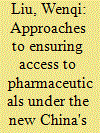| Srl | Item |
| 1 |
ID:
096425


|
|
|
| 2 |
ID:
088913


|
|
|
|
|
| Publication |
2009.
|
| Summary/Abstract |
The current Brazilian industrial property law (Law 9279 of 14 May 1996) allows patents for pharmaceuticals, along with the Agreement on Trade Related Aspects of Intellectual Property Rights provisions. Since 1999, after an amendment in the legislation, two governmental authorities-the Instituto Nacional da Propriedade Industrial (INPI) and the Agência Nacional de Vigilância Sanitária (ANVISA)-have been concomitantly acting in the patent-granting procedures for pharmaceuticals. The INPI is the office usually responsible for the examination and granting of patents, and the ANVISA is the agency primarily responsible for the granting of marketing approval of drugs. In a peculiar situation, the two institutions have been responsible for the granting or denial of applications and have very often been divergent in their positions. The patentability of pharmaceutical inventions claiming second medical use is an example. The purpose of this work is to analyze the current situation of the Brazilian patent-granting system in the pharmaceutical field, with a special focus on the patentability of inventions claiming second medical use. It debates the two governmental positions and questions whether the existing conflicts are harmful to the system.
|
|
|
|
|
|
|
|
|
|
|
|
|
|
|
|
| 3 |
ID:
105890


|
|
|
|
|
| Publication |
2011.
|
| Summary/Abstract |
Neodevelopmental patent regimes aim to facilitate local actors' access to knowledge and also encourage incremental innovations. The case of pharmaceutical patent examination in Brazil illustrates political contradictions between these objectives. Brazil's patent law includes the Ministry of Health in the examination of pharmaceutical patent applications. Though widely celebrated as a health-oriented policy, the Brazilian experience has become fraught with tensions and subject to decreasing levels of both stability and enforcement. I show how one pillar of the neodevelopmental regime, the array of initiatives to encourage incremental innovations, has fostered the acquisition of innovative capabilities in the Brazilian pharmaceutical sector, and how these new capabilities have altered actors' policy preferences and thus contributed to the erosion of the coalition in support of the other pillar of the neodevelopmental regime, the health-oriented approach to examining pharmaceutical patents. The analysis of capability-derived preference formation points to an endogenous process of coalitional change.
|
|
|
|
|
|
|
|
|
|
|
|
|
|
|
|
| 4 |
ID:
116902


|
|
|
|
|
| Publication |
2013.
|
| Summary/Abstract |
We routinely refer to pharmaceutical patents as intellectual property rights. The argument in this article is that pharmaceutical patents represent a 'bargain' between government, business and society. The pharmaceutical patent system constitutes a social institution with social goals that go well beyond solely providing incentives to proprietary pharmaceutical companies to develop innovative drugs. Therefore we need to assess this institution in terms of what is referred to here as its social effectiveness, that is, its ability to accomplish the social goals it was set up to achieve. Such assessment has to take into account the fact that the pharmaceutical patent system has now become global, a development that has made its social ineffectiveness more apparent and worrisome. The severity and gravity of unmet global and local public health needs compels urgent scrutiny of the pharmaceutical patent system, as well as of alternatives to it, such as prizes for pharmaceuticals.
|
|
|
|
|
|
|
|
|
|
|
|
|
|
|
|